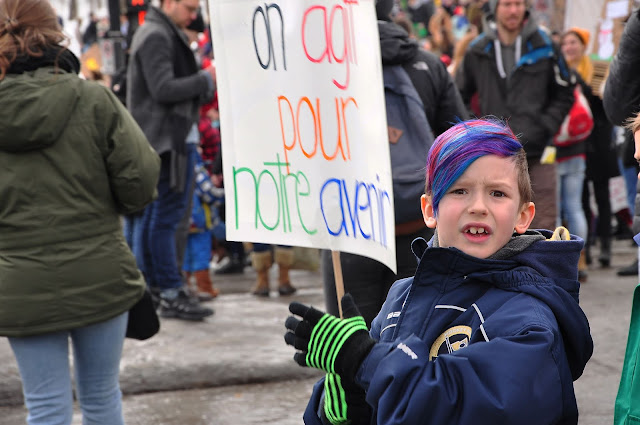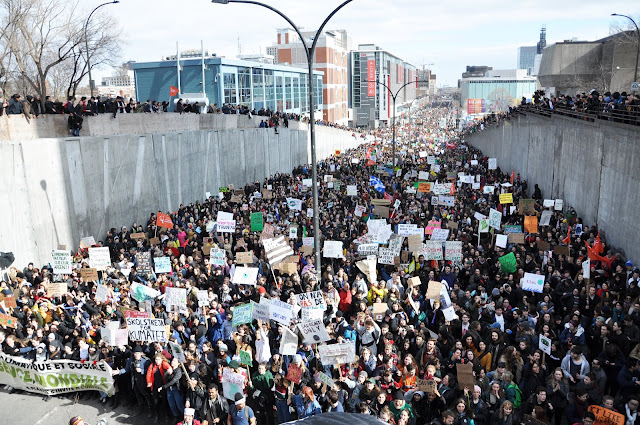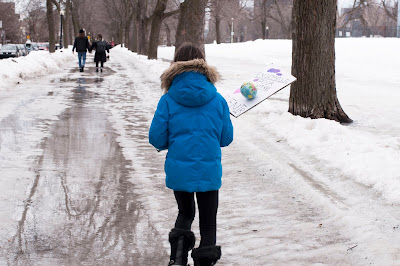Start by doing what's necessary; then do what's possible; and suddenly you are doing the impossible. -Francis of Assisi
''We act for our future''
Sign at the Student Strike for Climate Action - March 15, 2019.
Save the world! Save the climate!
On the frontlines of climate change awareness, the science has been clear for decades.
Yet, for many, the sense of urgency has not sunk in. ‘‘The world’’ seems like a distant land, far from us... So does ‘‘the climate’’- an abstract concept - intangible, elusive, unaffecting of our daily lives...
Of course, this couldn’t be further from the truth.
And while perception is not reality - admittedly - perception can become one’s reality. A society’s shared reality. History books abound with examples. Or just look at the ongoing genocide of Palestinians, by a generation that has lived their own massacre in the infamous Holocaust. But I digress...
So let’s get right to the point. To the genocide at hand, and what this environmental talk is really all about! (Not that we haven’t said it before!)
It is really a matter of saving OURSELVES!
Our children and grandchildren.
''If we don't do anything, we are next!''
Sign at the Student Strike for Climate Action - March 15, 2019.
Because the perverse effects of climate change are indeed so close, those alive today will see their lives as we know them, entirely disrupted by the policies and politics of their grandparents’ generations.
Small island states know it, they have seen the sea levels rise in their homelands. Countries close to the equator know it, their temperatures soar - every year a few days longer - above livable and workable conditions, particularly so with the lack of air conditioning - a commodity that only worsens global warming anyway. At the extremes, the poles are melting and burning.
By 2050 - UNLESS we take drastic measures to limit greenhouse gas emissions immediately - global temperatures will rise by at least 3.2C and unleash a chain of events that the scientists have already laid out for us.
Melting of the arctic permafrost releases methane gas trapped for millenia, right back into the atmosphere - a gas that has 28 times the global warming effects of our current enemy, CO2. It's like upgrading from a 6 bullets pistol to an AK47.
The fresh water of the glaciers returning to the Oceans impacts thermohaline circulation - the oceanic currents driven by temperature and salt gradients that maintain the global seasons as we have known them in our human history. Add enough cold, fresh water to a thermo-saline-dependent current and it slows down, to the point of stopping.
The last time this current stopped was during the last Glacial Period.
The rising levels of water will submerge over a thousand small island states, displacing millions of people (Where? With which funds? How do you reintegrate someone who has lived their whole life on the ocean - sustaining themselves with the natural resources available on their land - to survive in an ‘urban jungle’?)
The dying of a quarter of our biodiversity will have a chain of consequences impossible to predict but foreseeable to be disastrous -- like randomly pulling blocks from a carefully crafted Jenga tower, that is our ecosystem.
We care about the melting ice - the polar bears - the one in four mammals becoming extinct every day - because they are part of an ecosystem that allows us to survive. We care about the bees because they pollinate our crops and feed the world. We care about the atmosphere because we need oxygen to breath. We need temperatures to stay below a certain level because our own agriculture, work and economy will suffer - and as a consequence, WE will suffer.
We have 30 years to decide if we want our children to be born in a dying world.
''Why study to become an expert when we don't listen to today's experts?''
Sign at the Student Strike for Climate Action - March 15, 2019.
With the Covid 19 crisis, we’ve integrated the concept that the air we breath can be dangerous for us. That things we touch may in turn come back to harm us. We’ve learned to acknowledge the invisible, and we understand that ignoring something just because we can’t see it can have deadly consequences.
We have seen the virus hit hardest in the regions where the quality of air was particularly low, and harmful gasses concentrations high (How air pollution exacerbates Covid-19, BBC News). We’ve seen, just south of the border, the direct impact on the death toll that comes with a lack of preparation, and ignoring the scientists' warnings.
Today, the world has been confined. Our elderly are dying, with the rest of us helplessly waiting, unable to help or comfort them. Only a glimpse of what is to come when - likely by 2050 - temperatures will be too high to leave the house for many hours every day (Climate change: How hot cities could be in 2050, BBC News). That is, for those fortunate enough to afford AC. The poor, the eldery, will not make it, like the hundreds of thousands of people that have died in the last decade due to heat waves alone - to only mention the Western World.
We have begun to understand that what matters - the air we breathe - cannot be bought. That something invisible to the eyes can be what we cherish most.
But, the current pandemic has ALSO shown us that we can solve our biggest problems if we choose to. If we work collectively towards a goal and guide our policies upon science. The same applies to our biggest environmental problems.
There’s nothing stopping us but us.
So, as our scientific jolly grandfather put it... ‘‘In the midst of every crisis, lies great opportunity’’ (Albert Einstein).
So, let’s take this opportunity to shape a future where we collectively - as a political society - demand to cultivate our real priorities above all. Our health. Our families and friends. Our interconnectedness. Our Home. Our planet.
Basically... our survival.
Because - to paraphrase an analogy heard in a movie...
If you leave a car running in a closed garage, the carbon monoxide will inevitably kill you within minutes. The atmosphere is like a big garage.
Why would we think the outcome is going to be any different?
Sign at the Student Strike for Climate Action - March 15, 2019.






















































